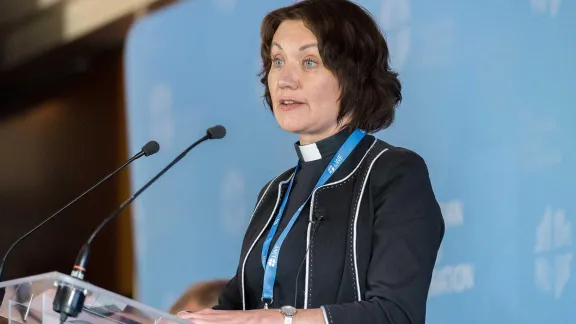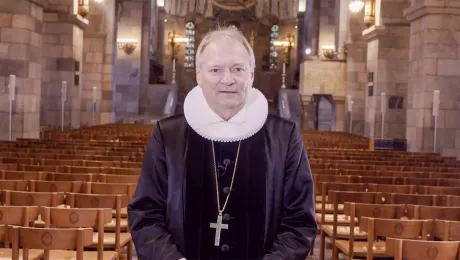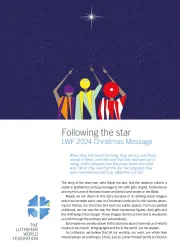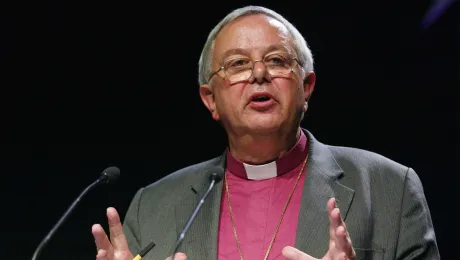
Rev. Dr Anne Burghardt, General Secretary of the LWF. Photo: LWF/Albin Hillert
LWF General Secretary addresses new Council reflecting on commitments in theology, ecumenism, mission and service
(LWI) - Eight months on from the Kraków Assembly, the General Secretary of the Lutheran World Federation (LWF) Rev. Dr Anne Burghardt addressed the new Council on 13 June, outlining achievements and challenges facing the global communion of churches. At a first full meeting since the Assembly, she thanked member churches for their continuing support of the LWF as it seeks “to remain truthful to its four founding pillars” of theology, ecumenism, mission and diakonia.
Reflecting on the context in which the LWF is working, Burghardt noted that recent regional meetings have highlighted several key concerns. These include the polarization of societies, the erosion of democratic structures and the instrumentalization of religion, alongside a lack of willingness to analyze root causes of problems and find constructive ways forward.
Burghardt stressed that it is “particularly dangerous when theologies and religious identities are radicalized” and instrumentalized for political ends. Against authoritarian leadership, which is “not in accordance with principles of servant leadership,” she said churches should model respectful dialogue, enhance critical thinking, call out misleading theologies and raise a prophetic voice against violations of human dignity.
Burghardt pointed to the rise of conflicts and displaced people around the globe and a worsening climate emergency, leading to increased humanitarian needs, alongside “a significant decrease in the funding of humanitarian aid organizations.” In many countries, concerns about a pushback against women’s human rights are growing, coupled with an increase in gender-based violence, she said.
In such a context, it may not seem easy to “offer a credible witness and share hope,” Burghardt said, adding that “there is no one size fits all solution to how best to share the gospel or raise the voice of the church in the public space.” In some regions, there are reports of increasing persecution of Christians; in others, churches are seeking to address people who have been alienated by secularism or attracted by the prosperity gospel. But she noted that many young people long for a “space where they can encounter God who offers guidance yet is merciful and provides a purpose for one’s life,” as well as “a theology that offers a countercultural voice” and a caring community.
There is no one size fits all solution to how best to share the gospel or raise the voice of the church in the public space.
LWF General Secretary Rev. Dr Anne Burghardt
She spoke of her visits to Central America, Indonesia, the Holy Land and Ukraine, highlighting the "heartbreaking” stories she heard from people she met in Jerusalem and in Kharkiv.
Ecumenism, theology, leadership
Turning to progress in ecumenical relations, Burghardt pointed to positive developments with many of the LWF’s partners. She noted that Lutherans and Catholics are moving towards a sixth phase of dialogue, while the Lutheran-Pentecostal dialogue is looking forward to a second phase and the Council is tasked with appointing Lutheran members to both of those commissions. She mentioned the Lutheran-Orthodox Commission which recently concluded a meeting in Cairo with two joint statements, one of which “has the potential to be truly ground-breaking.”
Reflecting on the LWF’s work to support the witness of its member churches, Burghardt spoke of two new theological study processes on the Theology of the Cross and on Peace and Reconciliation in Times of Conflict and War. “Theological education and formation remain a key priority of the LWF,” she said, including the vital task of nurturing a new generation of theologians through scholarships and regular accompaniment. On the liturgical front too, she noted a call for the development of accessible resources, including music and prayers, adding that the LWF will be reintroducing a desk for liturgical studies for the first time in almost two decades.
Burghardt underlined the ongoing work to provide training for both ordained and lay leaders, including in areas of peacebuilding and leadership in times of crisis. In particular, she highlighted the LWF’s commitment to supporting women in leadership through the formation of regional gender justice networks and its work to strengthen youth leadership and meaningful presence in all areas of church life.
Advocacy and humanitarian support
Burghardt also spoke of the LWF’s vital advocacy work of bringing local churches’ concerns to the global stage through engagement with the United Nations and other international organizations. She noted that the Council will be appointing a task force to develop a Climate Justice policy and she underlined the “significant milestone” represented by the launch of a new Gender Justice Toolbox, as the LWF marked ten years since the adoption of its pioneering Gender Justice Policy.
Moving on to review highlights of the humanitarian and development work, she said the LWF continues to provide vital support, not only to those suffering from the conflicts in Ukraine and the Middle East, but also to people who are displaced by crises that rarely receive any media attention, including Sudan, Myanmar, Ethiopia and the Democratic Republic of Congo. Beyond the impressive numbers of people who are served by LWF’s programs, Burghardt said “what is more important are the real lives that have been changed and transformed through the actions behind these figures.”
The general secretary concluded by urging all Council members to remain “actively engaged with the life of the LWF,” adding that one of the important tasks during this Council meeting will be the approval of the LWF Strategy for 2025-2031.


